 |
|||||||
|
Those we have not forgotten |
|||||||
| FTLComm - Tisdale - May 20, 2004 | |||||||
| Each of us share this time, each of these minutes and days with each other, but time is far more flexible and perhaps even elastic in the actual time in which we see ourselves as individuals. This is an important concept because if you write a historical novel today the story does not really pertain to the past but occurs in the time frame of the writer. To sort this out a little bit think about the old television show "M.A.S.H." presumably about a medical unit during the Korean War but that series was produced during the Vietnam War and it was a commentary on America's difficulty of dealing with the war in southeast Asia. | |||||||
| It seems appropriate to be considering this concept on this the seventh anniversary of this web site. The question we all must ask when we read or view material is "when" did it take place. Each story I post carries the date of the day it is posted, not necessarily the day the story is written. However, the mind set of the writer, or photographer for that matter comes into play when ever some creative work is undertaken. Some might like to call this problem perspective and as we grow older we become increasingly aware of our accumulated experience shaping our views of the present. | |||||||
| The more background you have on a writer, artist, musician, whatever, the more you can access the important motivating factor that many used to refer to as "where that guy is coming from." So it was that I was considering this very issue as we are clearly witnessing some very unusual times as morality becomes oppressive and belief systems replace reason. There is no doubt in my mind that these are dangerous times and verging upon even more dangerous times. As things and events slip over the horizon, what memories are left behind? And, what do those memories mean. In the middle of last Saturday night I was awakened and seen my monitors were up, as I was in the process of putting them to sleep a news story caught my eye, then another, so that each one seemed to me, to be painting some almost discernible story line. | |||||||
| America has taken on the role of world bad guy breaking the Geneva Convention, preaching freedom while executing actions of extreme repression at home and abroad. This list below evolved in a series of connections which I leave to you to connect but these memories are connected to the present and the present is seen through these memories. These are the people and events that I have not forgotten. What is interesting to point out is that many of these people and events are themselves distorted through time and interpretation. My memory told me that Jonas Salk and Robert Oppenheimer were Canadians but that is just mistaken memories for both are Americans and both scientist who changed this planet. | |||||||
| One more thing, this is a story, told in the lives of individuals and what they did the sequence here is important and meaningful. These are not forgotten. Links to the references are embedded in the text of this page but there is also a reference page with most of the links from the text. | |||||||
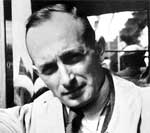 As a teenager the horror of the holocaust was to enter into my life
in an alarming manner. I was a passionate consumer of Life Magazine and when
Nazi death camp desired Adolph Eichmann was
caught by the Israelis and put on trial for what seemed
like years. I discovered this colossal event that had taken place just prior to my
birth and four year later many of those survivors established Israel. In the summer
of 1963 I handed an ice cream cone across the counter to an outstretched hand attached
to a bare arm, wrist facing up. There were numbers. I was overwhelmed unable to make
change and unable to speak, those death camps were not
just stories to frighten us, they were real. As a teenager the horror of the holocaust was to enter into my life
in an alarming manner. I was a passionate consumer of Life Magazine and when
Nazi death camp desired Adolph Eichmann was
caught by the Israelis and put on trial for what seemed
like years. I discovered this colossal event that had taken place just prior to my
birth and four year later many of those survivors established Israel. In the summer
of 1963 I handed an ice cream cone across the counter to an outstretched hand attached
to a bare arm, wrist facing up. There were numbers. I was overwhelmed unable to make
change and unable to speak, those death camps were not
just stories to frighten us, they were real. |
|||||||
 The embarrassment to a country for its soldiers to carry out mass slaughter
of civilians is a difficult thing and though the evens in and around My Lai in 1967
were not on the scale of Auschwitz The embarrassment to a country for its soldiers to carry out mass slaughter
of civilians is a difficult thing and though the evens in and around My Lai in 1967
were not on the scale of Auschwitz they were carried out by well meaning dedicated men. Patriots just like Eichmann only two decades earlier. Captain Medina was identified as ordering the "wasting" of those in an obscure village and it was done. Medina was charged and tried but then found not guilty. The man who lead the investigation into the My Lai incident was hard working and dedicated Colin Powell. |
|||||||
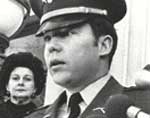 Medina had been witnessed "offing" civilians that day but it was a nice young man William Calley who now runs a jewelry store owned by his father-in-law who ended the lives of more than one hundred people in a little agricultural village. He was tried and found guilty and served eighteen months in jail. You need very much to understand that Calley is not now and never was some insane monster any more than the soldiers of the SS, ordinary good meaning people, who loved their country and followed orders as they had been trained to do. |
|||||||
|
|
|||||||
World War II and the ensuing Cold War are
a little hard to understand in a world where economic concerns seem to dominate all
facets of life but it was economics, the aftermath of the first war that led to the
second and it 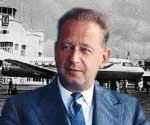 was
economics that led Russia to kill their Tsar and create a totalitarian
state. When things go haywire the goodness in mankind often emerges and with the
success of World War II the nations of the world put together the United
Nations and without a doubt, the most impressive leader in that organisation
was a Swedish "good guy" Dag Hammarskjold
who put everything he could into sorting out the world's woes. It was his achievement
to have soldiers dispatched to the Middle East to settle things down as "Peace
Keeping" was invented. Nationalism, not the Cold War was decolonialising
Africa and the good man was off to Africa to quell a catastrophe in the former
Belgium Congo. His aircraft crashed mysteriously. was
economics that led Russia to kill their Tsar and create a totalitarian
state. When things go haywire the goodness in mankind often emerges and with the
success of World War II the nations of the world put together the United
Nations and without a doubt, the most impressive leader in that organisation
was a Swedish "good guy" Dag Hammarskjold
who put everything he could into sorting out the world's woes. It was his achievement
to have soldiers dispatched to the Middle East to settle things down as "Peace
Keeping" was invented. Nationalism, not the Cold War was decolonialising
Africa and the good man was off to Africa to quell a catastrophe in the former
Belgium Congo. His aircraft crashed mysteriously. |
|||||||
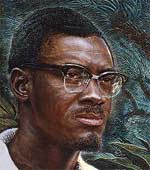 When Belgium realised that the era of colonialism was gone it
retain extensive financial interests in the southern portion of the massive country
and its companies, as well as financial interests in the United States directed
money into the hands of what was a kind of war lord. Meanwhile the country held its
first election and a charismatic postal clerk and brewery worker became the Congo's
first and only ever elected president. With investment flowing into the mineral rich
southern province of Katanga Patrice Lumumba's
new government was in trouble and Belgium
and others refused help. Desperation led Lumumba to accept transport aircraft
from the USSR and the White House issued directions to the CIA
to have Lumumba killed. He was captured and murdered
and since then, the Congo has been in a state of what can only be described
as civil war which often spills over its borders into neighbouring countries. When Belgium realised that the era of colonialism was gone it
retain extensive financial interests in the southern portion of the massive country
and its companies, as well as financial interests in the United States directed
money into the hands of what was a kind of war lord. Meanwhile the country held its
first election and a charismatic postal clerk and brewery worker became the Congo's
first and only ever elected president. With investment flowing into the mineral rich
southern province of Katanga Patrice Lumumba's
new government was in trouble and Belgium
and others refused help. Desperation led Lumumba to accept transport aircraft
from the USSR and the White House issued directions to the CIA
to have Lumumba killed. He was captured and murdered
and since then, the Congo has been in a state of what can only be described
as civil war which often spills over its borders into neighbouring countries. |
|||||||
One can often estimate the importance of an individual
by the people over whom the triumph. In post revolutionary Russia one man stands
alone as the master of shaping his side of the Cold War, and that was Nikita Khrushchev
who was party secretary when Joseph Stalin died. The struggle for leadership
of the empire was won by Khrushchev but he had to move 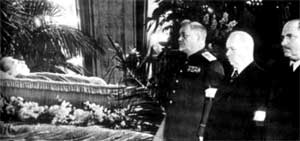 to the side other leaders from
the revolution era like Molotov and Malenkov but also a formidable
man Nikolai Bulganin. In a
political system based on power, often military force, the peaceful change in leadership
had only begun as Bulganin first seen after Stalin's death as an equal
with Khrushchev and Molotov. But without the rigours and horrors of
a Stalinist purge Bulganin recognised the consolidation of power in
the hands of the round little guy from the Ukraine and stepped aside. to the side other leaders from
the revolution era like Molotov and Malenkov but also a formidable
man Nikolai Bulganin. In a
political system based on power, often military force, the peaceful change in leadership
had only begun as Bulganin first seen after Stalin's death as an equal
with Khrushchev and Molotov. But without the rigours and horrors of
a Stalinist purge Bulganin recognised the consolidation of power in
the hands of the round little guy from the Ukraine and stepped aside. |
|||||||
|
|
the late Joseph Stalin, Nikolai Bulganin, Nikita Khrushchev, Vyacheslav Mikhailovich Molotov |
||||||
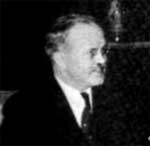 The Russian revolution was essentially only a modest beginning
as Lenin and the Bolsheviks brought an end to Tsarist Russia.
Lenin died and the revolution fell into the hands of various warlords. Trotsky
an able political and military leader was unable to handle the master of a far flung
civil war that seen Joseph Stalin dominate. But there were others including
a man who is best known for lending his name to a wine bottle filled with gasoline
and a rag wick, used as an incendiary bomb. Vyacheslav Mikhailovich Molotov, was a wily revolutionary politician and came within a hair
of grasping the brass ring. Though he had done well in the war against German, he
could not keep up with Khrushchev. The Russian revolution was essentially only a modest beginning
as Lenin and the Bolsheviks brought an end to Tsarist Russia.
Lenin died and the revolution fell into the hands of various warlords. Trotsky
an able political and military leader was unable to handle the master of a far flung
civil war that seen Joseph Stalin dominate. But there were others including
a man who is best known for lending his name to a wine bottle filled with gasoline
and a rag wick, used as an incendiary bomb. Vyacheslav Mikhailovich Molotov, was a wily revolutionary politician and came within a hair
of grasping the brass ring. Though he had done well in the war against German, he
could not keep up with Khrushchev. |
|||||||
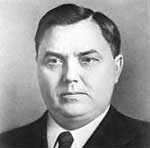 Malenkov was very close to Joseph Stalin and at the death of the man was Premier of the country. The quick changes in the political atmosphere as the Stalinist era was swept away exceeded Georgy Malenkov's ability to distance himself from the excesses of Stalin. Khrushchev had the support of the head of the KGB, Bera and Malenkov was history, being replaced with Bulganin. In 1961 Malenkov was kicked out of the party but was in charge of a remote power plant until he retired. |
|||||||
In the midst of World War II Saskatchewan had
its own revolution of sorts
as the CCF, lead by the brilliant orator from Weyburn, Tommy Douglas
came to power set upon ending the depression and establishing a future for the province.
One man doesn't make a government and though we focus on Douglas, his back
room was loaded with some interesting people. A speech writer and advisor was none
other than one of Saskatchewan's most distinguished lawyers, Morris M. C. Schumiacher
and several elected politicians who were instrumental in  shaping history. If you want to succeed in
something you need to handle the money and C. M. Fines was for much of the
Douglas era, the consummate minister of finance. During those years Saskatchewan
not only balanced the books, but was in the black most of the time. Most credit Fines
for this success and it allowed the province to establish the crowns, SaskPower,
SaskTel and SGI. Fines was actually acting premier when SaskTel
was created as a crown corporation May 9, 1947. Mr. Fines
left Saskatchewan to live out retirement in Mexico, there were rumors. shaping history. If you want to succeed in
something you need to handle the money and C. M. Fines was for much of the
Douglas era, the consummate minister of finance. During those years Saskatchewan
not only balanced the books, but was in the black most of the time. Most credit Fines
for this success and it allowed the province to establish the crowns, SaskPower,
SaskTel and SGI. Fines was actually acting premier when SaskTel
was created as a crown corporation May 9, 1947. Mr. Fines
left Saskatchewan to live out retirement in Mexico, there were rumors. |
|||||||
|
|
CM Fine, Tommy Douglas and Clarence Gills |
||||||
 Another member of Tommy Douglas' cabinet was a soft spoken man
who for many years was Saskatchewan's minister of education. In that role Woodrow
S. Lloyd was able to set the plan in motion
to create an excellent education system. An educator himself Lloyd's insight and
organisational planning brought about an widely based curriculum department and the
development of school units putting Saskatchewan's hundreds of independent schools
into a manageable structure. The implementation of universal medicare in Saskatchewan
was contested by many doctors and the political right with incredible ferocity and
overwhelmed Tommy Douglas and the steady Woodrow Lloyd stepped in to
see the plan through. Though others have made more noise, Lloyd was one of
Saskatchewan's most effective premiers. He made a difference. Another member of Tommy Douglas' cabinet was a soft spoken man
who for many years was Saskatchewan's minister of education. In that role Woodrow
S. Lloyd was able to set the plan in motion
to create an excellent education system. An educator himself Lloyd's insight and
organisational planning brought about an widely based curriculum department and the
development of school units putting Saskatchewan's hundreds of independent schools
into a manageable structure. The implementation of universal medicare in Saskatchewan
was contested by many doctors and the political right with incredible ferocity and
overwhelmed Tommy Douglas and the steady Woodrow Lloyd stepped in to
see the plan through. Though others have made more noise, Lloyd was one of
Saskatchewan's most effective premiers. He made a difference. |
|||||||
 To succeed in the rare atmosphere of Ottawa a politician has to have
a rather amplified image of himself and the representative for Moosomin in
the late 1950s and early 60s certainly had that. But also had other qualities, Alvin Hamilton was dedicated
to his farm supporters and knew that if given just half a chance they could get a
fair shake in a political and economic system that was seriously stacked against
them. As John G. Diefenbaker's minister of agriculture he established a two
price system for wheat, one price in Canada and another for export. He went to the
markets sold wheat and where necessary arranged for credit so that the USSR
and China could afford Canadian grain. In the history of Canada, Alvin
Hamilton is almost alone in being an advocate for Western Canadian agriculture,
others have said they were, but Hamilton delivered. Loyal to his leader, loyal
to Western Grain farmers and a remarkable Canadian. To succeed in the rare atmosphere of Ottawa a politician has to have
a rather amplified image of himself and the representative for Moosomin in
the late 1950s and early 60s certainly had that. But also had other qualities, Alvin Hamilton was dedicated
to his farm supporters and knew that if given just half a chance they could get a
fair shake in a political and economic system that was seriously stacked against
them. As John G. Diefenbaker's minister of agriculture he established a two
price system for wheat, one price in Canada and another for export. He went to the
markets sold wheat and where necessary arranged for credit so that the USSR
and China could afford Canadian grain. In the history of Canada, Alvin
Hamilton is almost alone in being an advocate for Western Canadian agriculture,
others have said they were, but Hamilton delivered. Loyal to his leader, loyal
to Western Grain farmers and a remarkable Canadian. |
|||||||
Colonialism was not just a feature of the nineteen century
but was a major factor in shaping the twentieth century. In Southeast Asia,
France, Holland, Britain, Portugal and the United
States hung on to their various possessions, far past the time that they were
welcome and as the second war 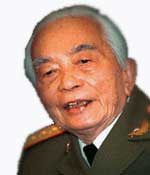 progressed it was time for change. Nationalism, not communism lead the
people in French Indochina to demand self government and when the Japanese
departed the French attempt to regain control was a non-starter. The man to
bring defeat to the French forces was General Giap and
his patriotic Viet Minh soldiers armed with weapons from China and
Russia. The United Nations created a sort of peace after the defeat
at Dien
Bien Phu on May 7, 1954 and an uneasy
truce was implemented along the DMZ (demilitarised zone). American Secretary
of State John Foster Dulles feared that China would sweep the whole
area and in the late fifties a series of CIA plots and actions soon had the
United States with ground and air forces engaged against the nationalist movement
sponsored by the North Vietnamese and directed by a tenacious and remarkable
strategic warrior, General Gaip. In 1968, six years after the United States
forces had been on the scene he was able to organise a massive country wide attack
known as the Tet Offensive. It was
the beginning of the defeat of American forces in Viet Nam. progressed it was time for change. Nationalism, not communism lead the
people in French Indochina to demand self government and when the Japanese
departed the French attempt to regain control was a non-starter. The man to
bring defeat to the French forces was General Giap and
his patriotic Viet Minh soldiers armed with weapons from China and
Russia. The United Nations created a sort of peace after the defeat
at Dien
Bien Phu on May 7, 1954 and an uneasy
truce was implemented along the DMZ (demilitarised zone). American Secretary
of State John Foster Dulles feared that China would sweep the whole
area and in the late fifties a series of CIA plots and actions soon had the
United States with ground and air forces engaged against the nationalist movement
sponsored by the North Vietnamese and directed by a tenacious and remarkable
strategic warrior, General Gaip. In 1968, six years after the United States
forces had been on the scene he was able to organise a massive country wide attack
known as the Tet Offensive. It was
the beginning of the defeat of American forces in Viet Nam. |
|||||||
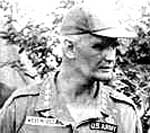 He was sent to command the American and South Vietnamese
forces in country in 1964 and came home after he successfully stopped the Tet
Offensive in 1968, became Chief of Staff. General Westmoreland
was sent to Vietnam to defeat and stop the advancement of communism and realised
that to do so, he would need a lot more people than he had at his command. Politically,
America was unwilling to support an all out effort to win a war for ideological reasons
and Westmoreland
was in charge of a war he knew he could not win and then in Washington he
had to plan a way of getting out of that same war. This West Point graduate
knew the danger of letting Giap surround and pound his forces with artillery
and did his best to preserve as many American soldiers as possible. Giap actually
consider the Tet a failure because of the horrendous casualties the Viet
Cong suffered, so many that he had to use North Vietnamese regulars for
most of the rest of the war. Had Westmoreland been given the forces he asked
for in 1968 the North would have been unable to sustain the conflict,
but world politics intervened Johnson withdrew from politics and in 1975 Saigon
fell. He was sent to command the American and South Vietnamese
forces in country in 1964 and came home after he successfully stopped the Tet
Offensive in 1968, became Chief of Staff. General Westmoreland
was sent to Vietnam to defeat and stop the advancement of communism and realised
that to do so, he would need a lot more people than he had at his command. Politically,
America was unwilling to support an all out effort to win a war for ideological reasons
and Westmoreland
was in charge of a war he knew he could not win and then in Washington he
had to plan a way of getting out of that same war. This West Point graduate
knew the danger of letting Giap surround and pound his forces with artillery
and did his best to preserve as many American soldiers as possible. Giap actually
consider the Tet a failure because of the horrendous casualties the Viet
Cong suffered, so many that he had to use North Vietnamese regulars for
most of the rest of the war. Had Westmoreland been given the forces he asked
for in 1968 the North would have been unable to sustain the conflict,
but world politics intervened Johnson withdrew from politics and in 1975 Saigon
fell. |
|||||||
 So, how many people get to start their own country? Jawaharlal Nehru
was the protégé of the pacifist, none violent political figure Mahatma
Gandhi, having had an outstanding English
education he became the Prime Minister of India when it became independent
from the British Empire on August 15, 1947. India was then and certainly
is now one of the worlds most difficult places to try to govern. In Nehru's situation
no sooner has he a deal to gain independence but was faced with the area of the country
inhabited by Moslem people splitting to form their own country (Pakistan)
and then setting upon India in the first Kashmir war. But through all that
Nehru had set a course that would carry his country forward without coming under
the economic and political control of either the Soviet or American
empires. His daughter and grandson became prime ministers of his country and this
past week his dead grandson's wife turned down the role in favour of some one born
in India. (She was born in Italy) So, how many people get to start their own country? Jawaharlal Nehru
was the protégé of the pacifist, none violent political figure Mahatma
Gandhi, having had an outstanding English
education he became the Prime Minister of India when it became independent
from the British Empire on August 15, 1947. India was then and certainly
is now one of the worlds most difficult places to try to govern. In Nehru's situation
no sooner has he a deal to gain independence but was faced with the area of the country
inhabited by Moslem people splitting to form their own country (Pakistan)
and then setting upon India in the first Kashmir war. But through all that
Nehru had set a course that would carry his country forward without coming under
the economic and political control of either the Soviet or American
empires. His daughter and grandson became prime ministers of his country and this
past week his dead grandson's wife turned down the role in favour of some one born
in India. (She was born in Italy) |
|||||||
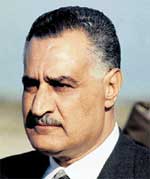 Though Egypt was considered a sovereign state it was essentially
controlled by Britain after World War I when the League of Nations
asked them to administer former Turkish colonies including Palestine
The head of government was King Farouk. In the Israeli emergence in 1948 Nasser was an Egyptian military officer fighting for the Palestinians
He came to power in what was essentially a military coup when the army ousted the
King and established a republic. Nasser was in
control of the leadership of the coup but was not immediately the head of state.
After an attempt at his assassination in 1954 he grabbed the reigns of power and
was in control of Egypt until his death in September 1970. During that time
he ceased the Suez Canal inflicting the wrath of England and France
as they attacked Egypt in 1956 and Israel grabbed the Sinai
desert. The United Nations brought peace with Canadian General E. L. M. Burns leading the UN Peace Keeping force that settled things down
for a decade. Nasser boldly attempted to unite all Arab countries into
a single nation to deal with Israel but only Syria join the project
which collapsed in 1961 with a coup in Syria. Nasser asked
the United Nations to withdraw its peace keeping force in 1967 and in June
of that year he blockaded the Israeli port of Aqaba and Israel
attacked Egypt inflicting an appalling defeat. He had very closely depended
on the Soviet Union for arms and equipment, but was throughout his life he
was a man striving to establish his country independent of colonial powers. Though Egypt was considered a sovereign state it was essentially
controlled by Britain after World War I when the League of Nations
asked them to administer former Turkish colonies including Palestine
The head of government was King Farouk. In the Israeli emergence in 1948 Nasser was an Egyptian military officer fighting for the Palestinians
He came to power in what was essentially a military coup when the army ousted the
King and established a republic. Nasser was in
control of the leadership of the coup but was not immediately the head of state.
After an attempt at his assassination in 1954 he grabbed the reigns of power and
was in control of Egypt until his death in September 1970. During that time
he ceased the Suez Canal inflicting the wrath of England and France
as they attacked Egypt in 1956 and Israel grabbed the Sinai
desert. The United Nations brought peace with Canadian General E. L. M. Burns leading the UN Peace Keeping force that settled things down
for a decade. Nasser boldly attempted to unite all Arab countries into
a single nation to deal with Israel but only Syria join the project
which collapsed in 1961 with a coup in Syria. Nasser asked
the United Nations to withdraw its peace keeping force in 1967 and in June
of that year he blockaded the Israeli port of Aqaba and Israel
attacked Egypt inflicting an appalling defeat. He had very closely depended
on the Soviet Union for arms and equipment, but was throughout his life he
was a man striving to establish his country independent of colonial powers. |
|||||||
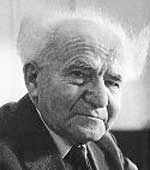 Nehru was the first prime minister in his country, Nasser was the first leader in modern Egypt and David Ben-Gurion was the first to lead Israel. Born in Poland in 1886, his father a Zionist (to establish a Jewish homeland) they moved to Israel in 1906. He was involved in the first kibbutz, was exiled during World War I. He had established himself as a leader and founder of Israel in May 14,1948 becoming its first Prime Minister. Before and after the establishment of the state of Israel it was faced with constant warfare losing 1% of its population in the initial conflict. Through it all Ben-Gurion never wavered from his belief and practice of democracy. |
|||||||
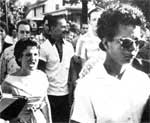 There were on eighty people in the tiny hamlet I grew up in
and I was the paperboy. I not only delivered but I also read. One of my customers
was a former American and when she applied for her old age pension was surprised
to discover he US birth certificate showed her as "Negro". Her son,
also a customer, had a daughter my age and we were, and are good friends. In the
summer of 1957 her cousin from Little Rock Arkansas came to visit in their
new Packard Clipper She was truly impressive and we were pen pals for quite
a while. That fall, the attempt to desegregate the public
schools in Little Rock were head lines and my pen pal attempted to explain
from her point of view, the situation. Her letters on this topic were a perfect description
of the white South's view of race relations. I did
not understand it then and it remains a mystery. There were on eighty people in the tiny hamlet I grew up in
and I was the paperboy. I not only delivered but I also read. One of my customers
was a former American and when she applied for her old age pension was surprised
to discover he US birth certificate showed her as "Negro". Her son,
also a customer, had a daughter my age and we were, and are good friends. In the
summer of 1957 her cousin from Little Rock Arkansas came to visit in their
new Packard Clipper She was truly impressive and we were pen pals for quite
a while. That fall, the attempt to desegregate the public
schools in Little Rock were head lines and my pen pal attempted to explain
from her point of view, the situation. Her letters on this topic were a perfect description
of the white South's view of race relations. I did
not understand it then and it remains a mystery. |
|||||||
 Chosen as one of the seven men with the "right stuff" Alan Shepherd. Served in world war II but did not become a navy aviator until 1947. Became a trained test pilot and was selected as an astronaut in April of 1959 with some 8,000 flying hours to his credit. H  e
was selected as America's first man to fly into space in a non-orbital flight May
5, 1961. He was grounded with an inner ear disorder but after surgery was able to
fly after May 1969. On January 31, 1971 he commanded the third flight to the moon,
Apollo 14, spending more than nine hours on the surface. All of that is pretty
impressive but he is on this list not for what he was suppose to do but for what
he did on his own accord. He smuggled a specially designed golf club aboard the capsule
and a golf ball, with one hand and on live television in colour for the first time,
he snapped off a nice golf shot that was the envy of every golfer on earth. e
was selected as America's first man to fly into space in a non-orbital flight May
5, 1961. He was grounded with an inner ear disorder but after surgery was able to
fly after May 1969. On January 31, 1971 he commanded the third flight to the moon,
Apollo 14, spending more than nine hours on the surface. All of that is pretty
impressive but he is on this list not for what he was suppose to do but for what
he did on his own accord. He smuggled a specially designed golf club aboard the capsule
and a golf ball, with one hand and on live television in colour for the first time,
he snapped off a nice golf shot that was the envy of every golfer on earth. |
|||||||
 The first person to swim across Lake Ontario and she accomplished this incredible feat September 9th, 1954 when Marilyn Bell was only sixteen years old. For us in Saskatchewan, two years before television, this historical event was on radio and it is like it just happened yesterday. Life for everyone is a series of firsts, but to be the first person to accomplish an act of endurance and bravery, that is something very, very, special. |
|||||||
 Playing for the Habs starting in 1947 Doug Harvey invented the modern approach to the position of defense. A smooth skater, a play maker, a goal scorer and when Maurice Richard retired he was the Canadien's captain. Few players since have matched his skill and ability to control the game from the back of the play. Most defenseman have tried to copy Doug Harvey but only Bobby Orr came close. When television first came to this part of the country Saturday night was almost always Toronto versus Montreal which meant; Richard, Geoffrion, Beliveau, the Tremblays and the man who made them all look good and the Leafs look, well look like Leafs (losers), Doug Harvey with six Stanley Cups in the 50s. |
|||||||
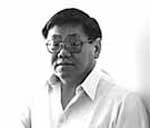 At only 5' 7" and a mere 170 pounds Normie Kwong play three years with the Calgary Stampeders and ten years for Edmonton Eskimos and still has records as a running back. His long career in a sport that destroys players sometimes in a few games lasted from 1948 to 1960. In retirement he was co-owner of the Calgary Flames and as such the only Canadian to win both the Grey Cup and the Stanley Cup. His first Grey Cup was when he was eighteen years old. He was born and still lives in Calgary. |
|||||||
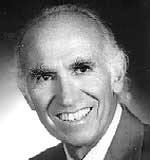 In a time when most medical research seems to be directed at simply making money it is good to consider a man who doggedly pursued a cure to a disease that was crippling and killing millions of people around the world. Taking a course that was greatly criticised, Dr. Jonas Salk developed a vaccine for polio using "killed" virus. He refused to profit from his research. He lived to be 80 years old as he died in 1995. Now that dread disease is almost eliminated from the planet. |
|||||||
Radio always played an important role in my life and
many of the people I have listened to hour after hour seem to be a part of me. The
maritimer, Max Ferguson
was a legend in his own time doing a comedy national morning show with skits, odd
characters and a lot
of good intentioned jokes needling the leaders of this country. Max's "Ole Rawhide" was a
marvel and each day you heard it you realised that this was something special and
you were on the inside catching a moment not to be repeated. "Ole
Rawhide" left the air suddenly in 1970
when for the first time Max was censored. The FLQ crisis in Quebec
had taken a nasty turn and insulted Canadians coast to coast. For Max it was a shock
and signaled his departure from national radio with the exception of being around
for his old buddy's odd ball show Eclectic Circus when he would join Allan McFee. lot
of good intentioned jokes needling the leaders of this country. Max's "Ole Rawhide" was a
marvel and each day you heard it you realised that this was something special and
you were on the inside catching a moment not to be repeated. "Ole
Rawhide" left the air suddenly in 1970
when for the first time Max was censored. The FLQ crisis in Quebec
had taken a nasty turn and insulted Canadians coast to coast. For Max it was a shock
and signaled his departure from national radio with the exception of being around
for his old buddy's odd ball show Eclectic Circus when he would join Allan McFee. |
|||||||
|
|
Max Ferguson and Allan McFee |
||||||
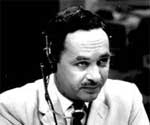 While Max Ferguson enjoyed the humour of politics Norman Depoe was the gravelly voiced hard hitting political interviewer on the hill in Ottawa. Though he had worked on radio, it was as a CBC television political reporter that Norman Depoe made his mark asking the right question at the right time, often creating a story right there on the spot. He grappled with John Diefenbaker and Lester Pearson to the point that no issue seemed to be settled until Canada's prime minister of the day answered Norman Depoe's question. |
|||||||
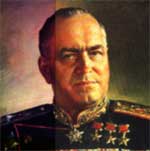 There are national heroes and there are just heroes. General Zhukov
was a world hero. Germany was only miles from Moscow and the huge country
was reeling from the most concentrated assault ever seen yet from that hopeless situation
the Red Army stopped the onslaught took horrible casualties but in the end
Zukov's army not only marched into Berlin, but grabbed most of Europe.
The decision to hang on to the whole of eastern Europe is hard for us to understand
but for the Russians it was just after suffering the lose of so many civilians
and soldiers that it seemed their proper reward or compensation. No matter what the
political leaders of the day decided the success on the battlefield and the way that
success occurred shaped the development of the Cold War and military
battlefield strategy for fifty years. There are national heroes and there are just heroes. General Zhukov
was a world hero. Germany was only miles from Moscow and the huge country
was reeling from the most concentrated assault ever seen yet from that hopeless situation
the Red Army stopped the onslaught took horrible casualties but in the end
Zukov's army not only marched into Berlin, but grabbed most of Europe.
The decision to hang on to the whole of eastern Europe is hard for us to understand
but for the Russians it was just after suffering the lose of so many civilians
and soldiers that it seemed their proper reward or compensation. No matter what the
political leaders of the day decided the success on the battlefield and the way that
success occurred shaped the development of the Cold War and military
battlefield strategy for fifty years. |
|||||||
 The twentieth century saw many remarkable developments in science
and technology but the development of an atomic bomb has to be right up near the
top of the list of things that changed the way people on this planet related to each
other. Knowing that Germany was attempting to create such a device, the United
States established the Manhattan Project in 1941 to make "the"
bomb and the man in charge in June of 1942 was quantum theoretical physicist Robert
J. Oppenheimer. After he and his team's
product has been used twice, Oppenheimer was
strongly opposed to further development from fission to fusion devices. His country
was in reactionary mode in the early 50s and in 1954 he was considered a communist
and security threat. The twentieth century saw many remarkable developments in science
and technology but the development of an atomic bomb has to be right up near the
top of the list of things that changed the way people on this planet related to each
other. Knowing that Germany was attempting to create such a device, the United
States established the Manhattan Project in 1941 to make "the"
bomb and the man in charge in June of 1942 was quantum theoretical physicist Robert
J. Oppenheimer. After he and his team's
product has been used twice, Oppenheimer was
strongly opposed to further development from fission to fusion devices. His country
was in reactionary mode in the early 50s and in 1954 he was considered a communist
and security threat. |
|||||||
|
|
Albert Einstein and Robert Oppenheimer |
||||||
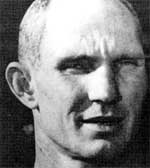 For seventeen long years Y.A. Tittle was a professional football player in both the NFL and AFL, a quarterback who from start to finish played well above average and deserved the respect of fellow players and fans. Some people are defined by what they do while others display determination and courage that would make them recognised and stand out in any field of activity. Tittle was one of those people who looked like he knew what he was about and accomplished the task facing insurmountable odds. |
|||||||
Talent and a great voice are nice things to have but
to make use of talent and great voice requires something very special. Lorne
Greene's voice and clarity of  speech made him the perfect radio
announce for CBC during the war years but he was always destine to be an actor
and this man from Ottawa Ontario became for television viewers around the
world, head of the Cartwright family on a western series that preached values and
was bent on showing the viewer that good could triumph over evil. Every Sunday night
my family and families all across North America got supper out of the way in time
to see Bonanza and then the Ed Sullivan show. The role played by Lorne Greene was more than just a TV character it was a man dealing with
a changing evolving world and having to cope with violence, economic challenge and
shepherding a family through trying times. In our family we began calling my father
"Paw" for a while. The influence of Lorne Greene and the role he
played went far beyond entertainment. speech made him the perfect radio
announce for CBC during the war years but he was always destine to be an actor
and this man from Ottawa Ontario became for television viewers around the
world, head of the Cartwright family on a western series that preached values and
was bent on showing the viewer that good could triumph over evil. Every Sunday night
my family and families all across North America got supper out of the way in time
to see Bonanza and then the Ed Sullivan show. The role played by Lorne Greene was more than just a TV character it was a man dealing with
a changing evolving world and having to cope with violence, economic challenge and
shepherding a family through trying times. In our family we began calling my father
"Paw" for a while. The influence of Lorne Greene and the role he
played went far beyond entertainment. |
|||||||
 On May 28, 1987 Mathias Rust a nineteen year old from Hamburg Germany took off with a rented Cessna 172, he refueled in Helsinki then flew on to Moscow without being challenged by Soviet air defense He circled Red Square three times before he spotted a safe place to land and put the 172 down on a bridge and then taxied into Red Square. Rust had concluded that it was time for peace that by landing in Moscow he could draw attention to the  fact that the Cold War had divided Europe long enough
and it was time for things to open up. He was jailed for 432 days almost in solitary
confinement. The 172 was recovered by it owner and sold for more than double its
price purchased by Japanese businessman as and investment. Mathias got into
trouble in 1989 when he lost control and stabbed a young woman and served five months
in jail. He has been married twice, converted to Hinduism and lives in Germany
working for Luxembourg financial company. But he is still working on political
international issues having established a think tank. fact that the Cold War had divided Europe long enough
and it was time for things to open up. He was jailed for 432 days almost in solitary
confinement. The 172 was recovered by it owner and sold for more than double its
price purchased by Japanese businessman as and investment. Mathias got into
trouble in 1989 when he lost control and stabbed a young woman and served five months
in jail. He has been married twice, converted to Hinduism and lives in Germany
working for Luxembourg financial company. But he is still working on political
international issues having established a think tank. |
|||||||
Conditions between the United States and the Soviet
Union were extremely tense at the end of the Eisenhower administration
as over flights by the United States were at issue. With peace talks about
to take place a secret aircraft, a Lockheed U2 surveillance
aircraft which had the ability to fly above air defenses and photograph ground installations
was sent from Turkey  over Russia. Unknown to the Americans the Soviet
Union had developed a missile capable of intercepting an aircraft
flying at 75,000 feet and the former military pilot, then flying as a CIA
civilian was captured May 1, 1960, when his aircraft was destroyed. Francis Gary Powers
was tried and imprisoned as a spy then exchanged for a Russian spy. In the
climate of the time Americans accused him of flying
to low, or even worse, having survived the ordeal. He later found work as a television
helicopter highway report pilot and was killed in an accident.
However, forty years after his downing in Russia, his family were given medals for
his efforts and his son flies the U2 in the service of his country. over Russia. Unknown to the Americans the Soviet
Union had developed a missile capable of intercepting an aircraft
flying at 75,000 feet and the former military pilot, then flying as a CIA
civilian was captured May 1, 1960, when his aircraft was destroyed. Francis Gary Powers
was tried and imprisoned as a spy then exchanged for a Russian spy. In the
climate of the time Americans accused him of flying
to low, or even worse, having survived the ordeal. He later found work as a television
helicopter highway report pilot and was killed in an accident.
However, forty years after his downing in Russia, his family were given medals for
his efforts and his son flies the U2 in the service of his country. |
|||||||
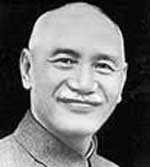 If you ever wonder why there is a separate government in Taiwan the man responsible is a warlord from the 1920s Chang Kai Shek. He had been a follower of the inspirational leader Sun Yat-sen in the movement to end the Imperial rule in China. A kind of multifaceted civil war began with Chang Kai Shek leading the Nationalist movement and the communists lead by Mao Tse-Tung. Their conflict was interrupted when Japan invaded and Chang Kai Shek obtained assistance from the United States and Britain. When the second world war ended the conflict resumed and in 1949 Mao's forces were in control of the country and Chang Kai Shek had retreated to Taiwan. |
|||||||
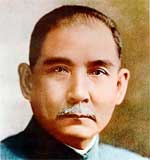 You and I have no choice in the matter the most powerful country in
the world is not the United States of America but is instead the only country
in the world with more than a billion people. Vast in size, diverse in culture, economic
monster and for almost all of its life a self contained world. China is older
than all other cultures on this planet and grasping the nature of it is beyond us,
but we have no choice but to get some insight into what it is about. Ruled since
ancient times by a complex monarchy system, it began a transformation before the
end of the 19th century. Economic and political thought was
bent on change and the centre of this intellectual process was Sun Yat-sen.
Both sides of what became the Cold War of the twentieth century trace their
roots to this man, in China's world of its own. The revolution against the Dynasty
and the evolution of modern China look at
this man's teaching as basic to their progress. You and I have no choice in the matter the most powerful country in
the world is not the United States of America but is instead the only country
in the world with more than a billion people. Vast in size, diverse in culture, economic
monster and for almost all of its life a self contained world. China is older
than all other cultures on this planet and grasping the nature of it is beyond us,
but we have no choice but to get some insight into what it is about. Ruled since
ancient times by a complex monarchy system, it began a transformation before the
end of the 19th century. Economic and political thought was
bent on change and the centre of this intellectual process was Sun Yat-sen.
Both sides of what became the Cold War of the twentieth century trace their
roots to this man, in China's world of its own. The revolution against the Dynasty
and the evolution of modern China look at
this man's teaching as basic to their progress. |
|||||||
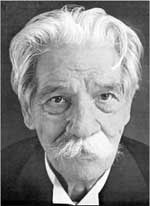 Talent and ability is not distributed evenly, often a single individual can be given in a whole range of things. This was the case with Albert Schweitzer who came from a family of religious and musical people near Strasbourg in Alsace, now a part of France. Though he became a scholar in theology and worked as a preacher he was an accomplished organist able to pay for his education and adventures with his earnings as a gifted concert player. He wrote highly acclaimed works on theology, Johann Bach and how to build an organ. With his earnings he graduated from medical school and with his wife set off to be an African missionary in the midst of the first world war. His Lambarene hospital, in French Equatorial Africa grew to be able to accommodate 500 patients. His scholarship continued as he published works on history and music. In 1953 he was awarded the Nobel Peace Prize. He died in 1965 at ninety years of age. |
|||||||
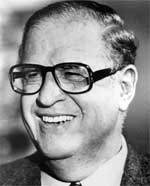 I was so profoundly struck by the eloquence of Abba Eban speaking before the United Nations that I wrote for and obtained the transcript of that event. His eloquence in English was equaled in no less than nine other languages. Born in Cape Town South Africa, raised in England, schooled at Cambridge where from 1938 to 1940 he lectured in Arabic. When Israel became a country he was its representative in Washington and later before the United Nations where he performed after the June 5th war in 1967. He served in his government and as a diplomat throughout his long life and died at 87 in November 2002. |
|||||||
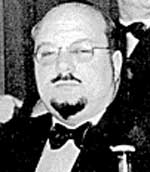 Some people get into trouble and some are born trouble makers. In various
stories I remember hearing how the King of Egypt was paid by filling a balance
bucket with the king's weight. It always seemed amusing but the real life king of
Egypt during my childhood, King Farouk,
was almost as unusual. He came to power at 16 in 1920 and quite simply enjoyed himself.
No amount of wealth was ever enough nor were there ever enough women. In many ways
Egypt was a colonial country of Britain but in local affairs the King
and his government did prevail. He did not spend much energy on governing and after
Egypt's defeat by Israel in 1948, things went bad for this bad boy
and in July 23, 1952 he was ousted. But during his reign, he was able to indulge
in some amazing things. He was a thief, stole artifacts from Iran, Winston
Churchill's watch and was a skilled pick-pocket. After being deposed he kept
up his life of excess to which he added gluttony and built an enormous pornography
collection. Some people get into trouble and some are born trouble makers. In various
stories I remember hearing how the King of Egypt was paid by filling a balance
bucket with the king's weight. It always seemed amusing but the real life king of
Egypt during my childhood, King Farouk,
was almost as unusual. He came to power at 16 in 1920 and quite simply enjoyed himself.
No amount of wealth was ever enough nor were there ever enough women. In many ways
Egypt was a colonial country of Britain but in local affairs the King
and his government did prevail. He did not spend much energy on governing and after
Egypt's defeat by Israel in 1948, things went bad for this bad boy
and in July 23, 1952 he was ousted. But during his reign, he was able to indulge
in some amazing things. He was a thief, stole artifacts from Iran, Winston
Churchill's watch and was a skilled pick-pocket. After being deposed he kept
up his life of excess to which he added gluttony and built an enormous pornography
collection. |
|||||||
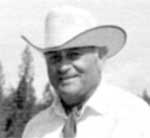 Though we can look at characters in public life abroad for reasons yet
unknown Canada seems to produce one screwball politician after another in British
Columbia. It seems that to qualify for public life in B.C. you have to
leave common sense out of your life and even those who are normal folks when they
enter B.C. politics it doesn't take long for them to wander off in the "over the top" realm.
Various premiers catch in B.C. catch our attention but I suspect one of the
sources of these free spirits comes from the attitude of the B.C. minister
of highways from 1952 to 1968, Flyin' Phil Gaglardi.
He had great achievements in expanding the provinces highway system and made excellent
use of these highways often collecting a sizable number of speeding tickets. However,
it was getting the province to buy a Lear Jet that gained him his nickname. Though we can look at characters in public life abroad for reasons yet
unknown Canada seems to produce one screwball politician after another in British
Columbia. It seems that to qualify for public life in B.C. you have to
leave common sense out of your life and even those who are normal folks when they
enter B.C. politics it doesn't take long for them to wander off in the "over the top" realm.
Various premiers catch in B.C. catch our attention but I suspect one of the
sources of these free spirits comes from the attitude of the B.C. minister
of highways from 1952 to 1968, Flyin' Phil Gaglardi.
He had great achievements in expanding the provinces highway system and made excellent
use of these highways often collecting a sizable number of speeding tickets. However,
it was getting the province to buy a Lear Jet that gained him his nickname. |
|||||||
 Now Saskatchewan has had some very colourful politicians in its
history as well but one of the most lovable was the long time Mayor of Regina,
Henry Baker. He had a group of cronies who worked together to please their
supporters and get themselves re-elected. Henry and his friends were the consummate
politicians, no public event was to small to make an appearance and there was always
time to listen to complaints, concerns and check on the family. Henry was charming
and absolutely untiring working day and night for his city and its people. He was
pretty well apolitical but knowing that the NDP was more likely to win that
Liberals or Conservatives he decided at one point that he has achieved
as much as he could for Regina as Mayor and became the Member of
Legislature as well. He had many critics, but he was loved by most of the voters
in the city, for most of the time and he deserved both respect and affection simply
because he was a practicing believer in the political process. For Henry Baker
politics was personal, it was friendly and the government of the city being there
to help and serve its people. Now Saskatchewan has had some very colourful politicians in its
history as well but one of the most lovable was the long time Mayor of Regina,
Henry Baker. He had a group of cronies who worked together to please their
supporters and get themselves re-elected. Henry and his friends were the consummate
politicians, no public event was to small to make an appearance and there was always
time to listen to complaints, concerns and check on the family. Henry was charming
and absolutely untiring working day and night for his city and its people. He was
pretty well apolitical but knowing that the NDP was more likely to win that
Liberals or Conservatives he decided at one point that he has achieved
as much as he could for Regina as Mayor and became the Member of
Legislature as well. He had many critics, but he was loved by most of the voters
in the city, for most of the time and he deserved both respect and affection simply
because he was a practicing believer in the political process. For Henry Baker
politics was personal, it was friendly and the government of the city being there
to help and serve its people. |
|||||||
 I doubt if the twentieth century will be known for its advances in religion. In a time when emotional fundamentalism in Christianity and Islam have promoted extremism we have seen few positive lights. I once commented to a United Church minister that I thought the most significant event in spiritual belief in our time was the screen play in the movie "OH God". The minister was insulted. But there was one very bright light in my lifetime. Pope Pius XII may have been an accomplice in the Nazi holocaust but his successor was everything his predecessor was not. The cardinals needed time to develop a new pope and decided to go with an old guy at the death of Pius XII and named Pope John (Angelo Guiseppi Roncalli) October 28, 1958, only a month away from his seventy-seventh birthday. From then until his death in June of 1963, the Roman Catholic Church got a much needed overhaul, but he also opened the doors to all other faiths, as his doctrine of ecuminicalism was a philosophy of inclusion. His Second Vatican Council set force a new form of Catholic worship and made Christianity and all religions more relevant |
|||||||
 Though we all can site many clear and obvious differences between Canada
and the United States I suspect that one of the best examples is how we Canadians
deal with law enforcement. Our federal police force (Royal Canadian Mounted Police)
is actually a "military police" but they are responsible to the crown for
maintaining law and order in the Dominion. From 1924 until 1972 the national police
force of the United States, the Federal Bureau of Investigation (FBI)
was in the hands of a single and enormously powerful individual, J. Edgar Hoover.
He was educated as a lawyer and lived with his mother until her death when he was
43. His background is undocumented with a
single New Yorker article of some 500 words on him written in 1937. At the
time he became its director the Bureau had 650 people. Though we all can site many clear and obvious differences between Canada
and the United States I suspect that one of the best examples is how we Canadians
deal with law enforcement. Our federal police force (Royal Canadian Mounted Police)
is actually a "military police" but they are responsible to the crown for
maintaining law and order in the Dominion. From 1924 until 1972 the national police
force of the United States, the Federal Bureau of Investigation (FBI)
was in the hands of a single and enormously powerful individual, J. Edgar Hoover.
He was educated as a lawyer and lived with his mother until her death when he was
43. His background is undocumented with a
single New Yorker article of some 500 words on him written in 1937. At the
time he became its director the Bureau had 650 people. |
|||||||
 When Alan Mill's show was over it was time for "Just Mary", a fifteen minute show where this former elementary teacher would read to here attentive audience. The secret to success in children's radio programming was something the CBC had developed yet seems to have forgotten since the dominance of television. The spoken, or in Mary Grannan's case, read word has enormous power and to a child, the selection of the material and that warm anticipated friendly voice was a pure gift. |
|||||||
|
|
|||||||
|
|
There are many more I would like to add to this list, the music writers who filled minds with words and songs, a group of women who made a difference and a few more Canadian politicians we should not forget. But these will have to wait until another time. I would enjoy hearing your comments on the people and events featured in this list. | ||||||
|
|
|||||||
|
|
|||||||
|
|
|||||||
| Reference page | |||||||
|
|
|
||||||
|
|
|||||||
|
|
|
||||||
|
|
|||||||
|
|
|||||||
|
|
|||||||
|
|
|||||||